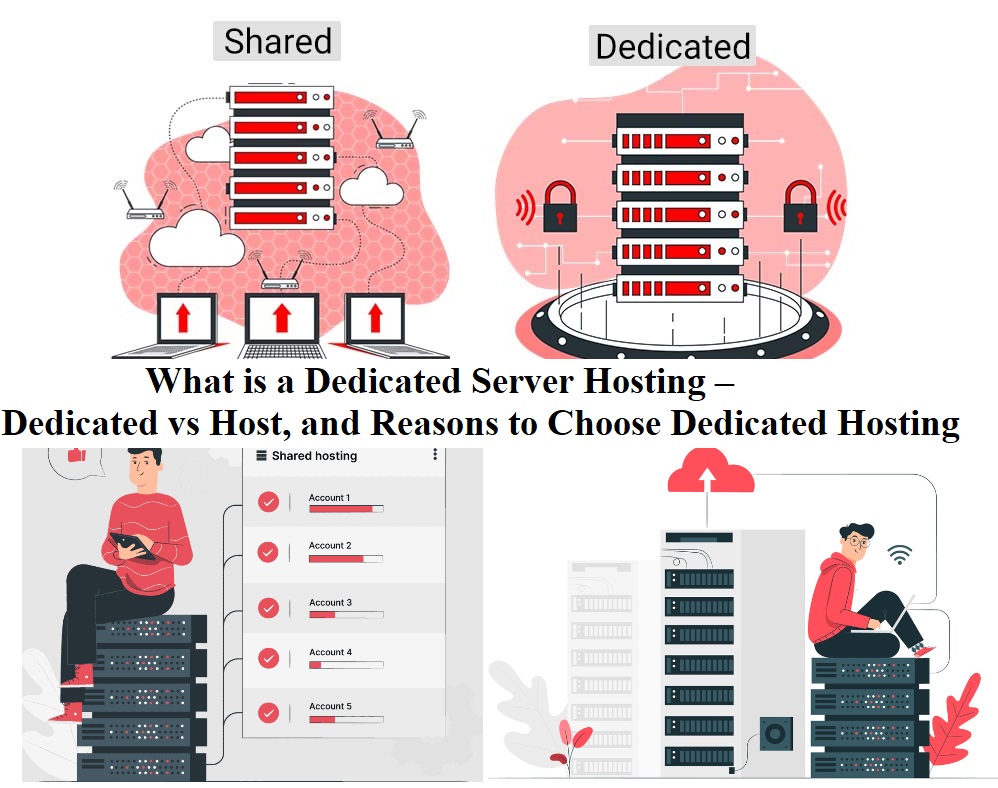What is the Difference between a Dedicated Server and a Host?
The difference between a dedicated server and a host primarily revolves around the concepts of server allocation and management in web hosting. A dedicated server is a specific type of hosting solution providing exclusive access to a physical server, "host" encompasses various types of hosting services that may or may not offer dedicated resources.Dedicated Server
A dedicated server refers to a physical server that is exclusively allocated to a single client or organization. This means that all the server's resources such as CPU, RAM, storage, and bandwidth are fully reserved for that client, providing enhanced performance, security, and control over the server environment. Key features include:-
Exclusive Use
The client has complete access to all resources without sharing with other users, which leads to better performance and reliability. -
Full Control
Clients can configure the server to meet their specific needs, including choosing the operating system and installing required software. -
Higher Security
With no other users on the same server, there is a reduced risk of security breaches that can occur in shared environments.
Host
The term host is broader and can refer to any service provider that offers hosting solutions, which may include shared hosting, virtual private servers (VPS), cloud hosting, or dedicated servers.-
Shared Hosting
Multiple clients share the same physical server and its resources, which can lead to performance issues if one site experiences high traffic. -
VPS Hosting
A single physical server is divided into multiple virtual servers, giving clients a portion of the resources while still sharing the underlying hardware with others. -
Cloud Hosting
Resources are distributed across multiple servers in a network, allowing for scalability and flexibility but not necessarily exclusive access to any single server.
Who Needs Dedicated Hosting and Why?
Dedicated hosting is particularly beneficial for specific types of users and organizations that require enhanced performance, control, and security for their online operations. Organizations that require high performance, increased security, custom configurations, or expect significant growth are prime candidates for dedicated hosting solutions. This type of hosting enables them to optimize their online presence and ensure robust operational capabilities tailored to their specific needs. Here are the primary groups that typically need dedicated hosting and the reasons why:-
High-Traffic Websites
Websites that experience significant traffic, such as e-commerce platforms or popular blogs, require dedicated resources to handle the load without performance degradation. Dedicated servers ensure that these sites can maintain fast loading times and reliability even during peak traffic periods.
-
Resource-Intensive Applications
Organizations running complex applications, such as data analytics tools, high-resolution video streaming services, or gaming servers, benefit from the powerful processing capabilities of dedicated servers. These applications often demand substantial CPU and RAM, which dedicated hosting can provide without competition from other users.
-
Businesses with Security Concerns
Companies that handle sensitive data, such as financial institutions or healthcare providers, require heightened security measures. Dedicated servers offer a more secure environment since they are not shared with other clients, reducing the risk of data breaches and allowing for customized security protocols.
-
Organizations Anticipating Growth
Businesses planning for significant growth or increased traffic may choose dedicated hosting to ensure their infrastructure can scale effectively. Dedicated servers can be configured and upgraded to meet changing demands without the limitations often found in shared or VPS hosting environments.
-
Custom Software Requirements
Companies that need to run specific software applications that require particular configurations or operating systems (like Windows Server for certain applications) will find dedicated hosting advantageous. It allows for full customization of the server environment to meet unique business needs.
-
Mission-Critical Applications
For applications that are crucial to business operations such as ERP systems or customer relationship management (CRM) software dedicated servers provide the reliability and uptime necessary to ensure continuous operation without interruptions.
